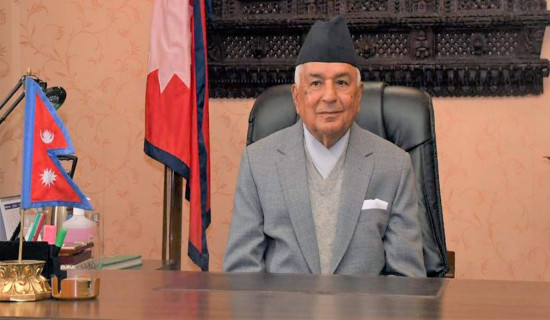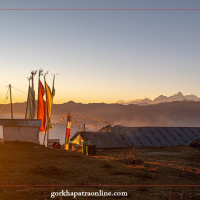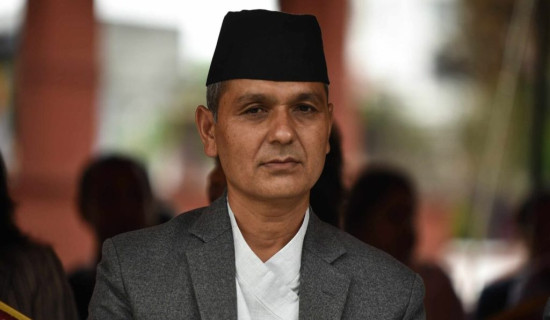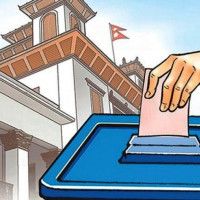- Thursday, 19 February 2026
Investment Summit puts Nepal in global limelight
Kathmandu, Apr. 29:The 3rd Nepal Investment Summit-2024 has begun in Kathmandu.
Prime Minister Pushpa Kamal Dahal ‘Prachanda’ inaugurated the two-day Summit amidst a grand ceremony on Sunday morning. The much-awaited summit, expected to serve as a platform to unleash the untapped and unlocked potential of Nepal through domestic and foreign investment, has drawn significant international participation.
Inaugurating the Summit, Prime Minister Prachanda said that Nepal is emerging as a premier investment destination, offering boundless opportunities for global investors and called upon them to take advantage of this opportunity.
“Nepal is a country that wholeheartedly welcomes foreign investment. Nepal stands at the centre of opportunities, welcoming investors with its untapped potential. Our unwavering commitment to liberal economic policies lays the foundation for a vibrant and investor-friendly business environment,” he said.
“We are strongly committed to carry out continuous reforms to facilitate the investors, industrialists, innovators and easing of doing businesses. In this context, the government of Nepal has recently amended eight different laws governing business and investment regime. I believe, this will boost the investors’ confidence to invest in Nepal.”
As a nation of peace and stability, the government has created a conducive environment for economic growth and prosperity, he said and added that federal system of governance ensures a balanced development approach fostering social and economic transformation across the nation. Nepal provides a number of incentives to foreign investors, including a robust regulatory framework, provision for the avoidance of double taxation, protection of intellectual property rights, and competitive corporate taxation, among others, he said.
“The government of Nepal has recently approved the framework of Bilateral Investment Agreement (BIA), which aims to protect and promote bilateral investment. I encourage all our friendly nations to consider signing the BIA at the earliest,” he added.
He said that Nepal's skilled manpower and low labour cost would also attract international investors.
“Provisions of national and non-discriminatory treatment to all FDIs and guaranteed repatriation in foreign currency further enhance the attractiveness of investing in Nepal,” he said.
Stating that with over 60 per cent of Nepal's population falling within the working-age group and a rapidly expanding middle-class population showed the immense potential for consumer-driven growth, he said that our skilled labour force, comprising a significant number of foreign language speaking youths would help the international investors to find favourite local workforce in Nepal.
“Nepal provides a number of investment opportunities across diverse sectors, including tourism, agriculture, manufacturing, ICT, readymade garments, high value crops manufacturing, including agro-processing and infrastructure,” Prime Minister Prachanda said. "The abundant potential of hydropower generation has expressed commitment to renewable and clean energy supply. The rich cultural heritage and natural beauty indicate the strong potential of the tourism sector.”
Although, Nepal has a huge potential of hydropower generation, only 3,200 MW have been harnessed so far and about 5,568 MW large scale power projects are under construction or in the pipeline of execution through Public-Private Partnership (PPP) modality.
Prime Minister Prachanda said that the electricity trade agreement with India, the cooperation agreement with China and the electricity export agreement with Bangladesh have prepared enough ground for investment.
He said, "This clearly shows the abundant opportunities to invest in the hydropower sector in Nepal. The under-construction cross-border transmission line connecting India and China will facilitate energy exchange within the region.”
“Nepal's strategic location, situated between emerging markets, India and China, signifies it as an ideal investment destination. Duty-free access to these markets, facilitated by regional agreements SAFTA and BIMSTEC as well as free trade arrangements, ensure the bilateral and regional markets,” he added.
“To facilitate the smooth inflow of international private investments, the Department of Industry serves as the approving agency for investments of less than Rs. 6 billion, while the Investment Board Nepal handles investments exceeding Rs. 6 billion or energy projects with over 200 MW.
Both government agencies are committed to provide eased and facilitated one-stop services within stipulated time frame to both domestic and international investors,” he said.
Stating that investment in Nepal was profitable as witnessed in the case of various companies operating in Nepal with significant foreign investment, he said that share of repatriation of dividend of those companies remains impressive, which demonstrates the profitable investment environment in Nepal. The multitude of projects to be showcased at this summit herald the vast opportunities of investment in Nepal, with the promise of tangible outcomes benefiting both our nation and potential investors, he said.
“As we embark on this collective journey, I am confident that Nepal's immediate goal of achieving sustainable and high economic growth in the coming decade is well within the reach through partnership with the private sector both domestic and foreign. With the collaboration and support of all, I am optimistic that we will harness Nepal's economic potential and chart a course towards economic transformation and prosperity,” he said.
All areas of Nepal are open for foreign investment: Deuba
On the occasion, President of Nepali Congress and Former Prime Minister Sher Bahadur Deuba said that Nepal’s investment regime is now liberal in terms of sectors open for foreign investment, tax policies and repatriation of earnings.
“Almost all sectors are open for foreign investment. Agriculture, tourism, infrastructure development, mines and minerals, manufacturing, tourism, hydropower and IT are some of the key sectors where domestic and foreign investment will have transformative impact,” he said. He expressed his hope that deliberations in the Summit and various instruments of cooperation and partnership that will be exchanged during the Summit will pave the way for greater flow of investment into Nepal. “Nepal is still a least developed country. We confront huge development challenges. While our country has huge potential for development, we lack adequate capital and appropriate technology to realize development benefits. In this context, the convening of this high-level event assumes a particular significance,” he said.
Stating that foreign investment is protected by domestic law and various international instruments to which our country is a party, he said the government has expressed its willingness to conclude bilateral investment protection agreement with various countries to promote Nepal as an attractive destination for investment.
“Flexible labour law, demographic dividend with a substantial share of young and energetic population, reliable supply of electricity, and availability of local raw materials will also contribute to keep production cost low compared
to other high wage countries in the region,” he said. Moreover, all major political parties of Nepal remain committed to promote foreign investment in Nepal and come together to foster consensus on key investment related issues, Deuba added.
“Internal market is expanding with increase in income of people and external market is accessible due to geographical proximity and concessional trading facilities that we receive from our neighbours and other partners. Our two neighbours - India and Chin - offer huge market opportunities for Nepal. We also have supportive trading relationship with USA and EU,” he said.
Nepal grows attractive for international investment: Pun
Finance Minister Barsaman Pun said that the government was committed to collaborating with the private sector through private direct investment and various other models of public-private partnership. “With a view to improving the doing business environment and boosting investors' confidence, we have initiated various policy reforms.
These reforms include improving regulatory processes, reducing the time and cost of business, and ensuring transparency and accountability in public sector governance. Reform is an ongoing process; it will be continued in the days to come,” he said.
He said that the summit would serve as an important milestone for unleashing Nepal's tremendous investment potential and charting a path towards sustainable economic growth.
“Let us grab the opportunity to forge new partnerships, drive innovation, and create a brighter future for all,” he said.
He said that the government of Nepal sought to facilitate productive negotiations and come up with a number of agreements and Memoranda of Understanding (MOUs) between investors and stakeholders, advancing project development and management objectives.
Chief Executive Officer of the Investment Board Nepal (IBN) Sushil Bhatta appreciated participation of the high-level delegation from different countries, development partners, and multilateral donors who showed their interest to invest in Nepal’s potential sectors.
He expressed his hope that the potential investors could learn about the recent policy reforms and infrastructural advancements making Nepal an attractive investment destination and network with public agencies, foreign investors, local businesses, and international development partners.
On the occasion, representatives of Kathmandu-based missions, development partners and private sectors have expressed their views with priority to collaborate for exploring untapped and unlocked potential sector of Nepal.
About 1,700 persons, including investors, high-level government dignitaries from about 55 different countries, are participating in the Summit.
















